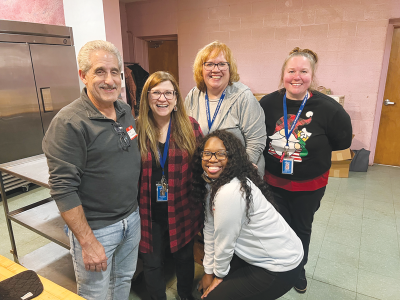
Volunteers and staff at Spaulding for Children help make a past holiday party at First Baptist Institutional Church in Detroit a great time for foster children and families.
Photo provided by Spaulding for Children

Volunteers assist at the dessert table during a past Spaulding for Children holiday party for foster families at First Baptist Institutional Church.
Photo provided by Spaulding for Children
METRO DETROIT — Around 10,000 children in Michigan are currently in foster care, but the need for loving homes remains constant.
Foster mom Michele Austin decided to open up a foster closet in her own home in 2013 to give other foster families access to items that she knew foster kids needed.
“When my very first foster child came to me, he didn’t have anything, so I started talking to family and friends and opened up the closet in my home to help other foster families,” she said.
The closet grew by leaps and bounds, and in 2018 the Oakland County Foster Closet opened as a 501(c)(3) nonprofit and expanded into an office building. Today, the Oakland County Foster Closet, a nonprofit based in Farmington Hills, offers supportive services, supplies and aid to children in the foster care system and to those in crisis situations at no cost.
“We offer all of the basic essentials that kids need in life: hygiene items, clothing, socks, underwear, school supplies — everything that they would need, and we do that absolutely for free for our foster kids and for low income,” she said.
The closet is currently in dire need of hygiene items such as shampoo, conditioner, soap, lotion toothbrushes, toothpaste and more.
“We’ve seen a significant amount of need, because people are really struggling right now,” said Austin.
The Oakland County Foster Closet also has many volunteer options available, including one-time, once-in-a-while, and weekly opportunities for individuals and groups. For more information, call the Oakland County Foster Closet (248) 419-4487.
“It’s a really fulfilling type of volunteering because you’re seeing the impact and feeling the impact,” Austin said.
May is Foster Care Month, and Michigan Department of Health and Human Services Director Elizabeth Hertel said she is thankful for the thousands of families across the state who have already opened up their hearts and homes to care for youth in foster care, but she said more foster families are needed to provide temporary care while the state works to reunify kids with their parents.
“There continues to be a need for more foster families to provide stable and safe family homes for children of all ages in the state’s care,” Hertel said in a statement.
Many foster children have been victims of abuse and neglect, and officials say they need a nurturing environment until they can be safely reunified with their parents or — in a smaller number of cases — until they can find adoptive homes if it’s not safe for them to return home.
In Michigan, the first step to becoming a foster parent is contacting a “foster care navigator” — experienced foster parents who can answer questions, help individuals find an agency that’s right for them, assist families with the foster home licensing process and provide guidance along their journey to becoming a foster parent. A foster care navigator can be reached at 855-MICHKIDS or www.Fcnp.org.
Spaulding for Children — a private, nonprofit child welfare agency located in Southfield — was established in 1968 to find permanent and safe families for children.
Spaulding for Children President and CEO Melissa Jenovai said there is an increased awareness of the need to search out relatives for foster children in Michigan.
“If we can’t prevent them from coming in, we know the next best place for them to go would be with a relative,” she said. “We have put a lot more effort into searching for those relatives up front, and the outcomes tend to be much greater for children and youth who are placed with their kinship families — there’s more stability, and there are better mental health outcomes for those kids.”
But, oftentimes, kids who enter the system don’t have a family member available, so the need for nonrelative foster homes remains constant.
“It can take a person, on average, seven years from the time they inquire about becoming a foster or adoptive parent, all the way up until the point that they decide to take that step and become one,” Jenovai noted.
The Michigan Department of Health and Human Services provides foster families a daily rate to help with the care of foster children based on the age and needs of the child. Foster families also receive a semi-annual clothing allowance, and many families qualify for reimbursement for the costs of day care, according to state officials. Children in foster care are eligible for Medicaid, which pays for medical, dental and mental health care.
Spaulding for Children offers monthly online orientation classes for those interested in becoming a foster or adoptive family. In June, orientation sessions will be held 6-7:30 p.m. June 12 and 1-2:30 p.m. June 20. Register by contacting Stacey Oakes at (248) 443-0300 or soakes@spaulding.org, or visit www.spaulding.org.
“Coming to an orientation does not commit you to anything. It really just helps you to learn about the need, and maybe if you decide this isn’t something for you, then you can encourage others to reach out and provide support or learn about it to eventually become an adoptive or foster parent,” Jenovai said.
Those who aren’t ready to become a foster or adoptive parent can still offer support to foster children through monetary donations to organizations dedicated to helping those in the system, volunteering during an event and more.
“We really believe that the more opportunities that we involve the community in and offer our families these positive experiences that in turn helps offset some of the trauma that our kids and families have experienced over the years. The more positive events we can have, the better outcomes we hope to be able to provide with our kids and our families,” Jenovai said.
To learn more about foster care, visit Michigan.gov/HopeforaHome.
 Publication select ▼
Publication select ▼



























